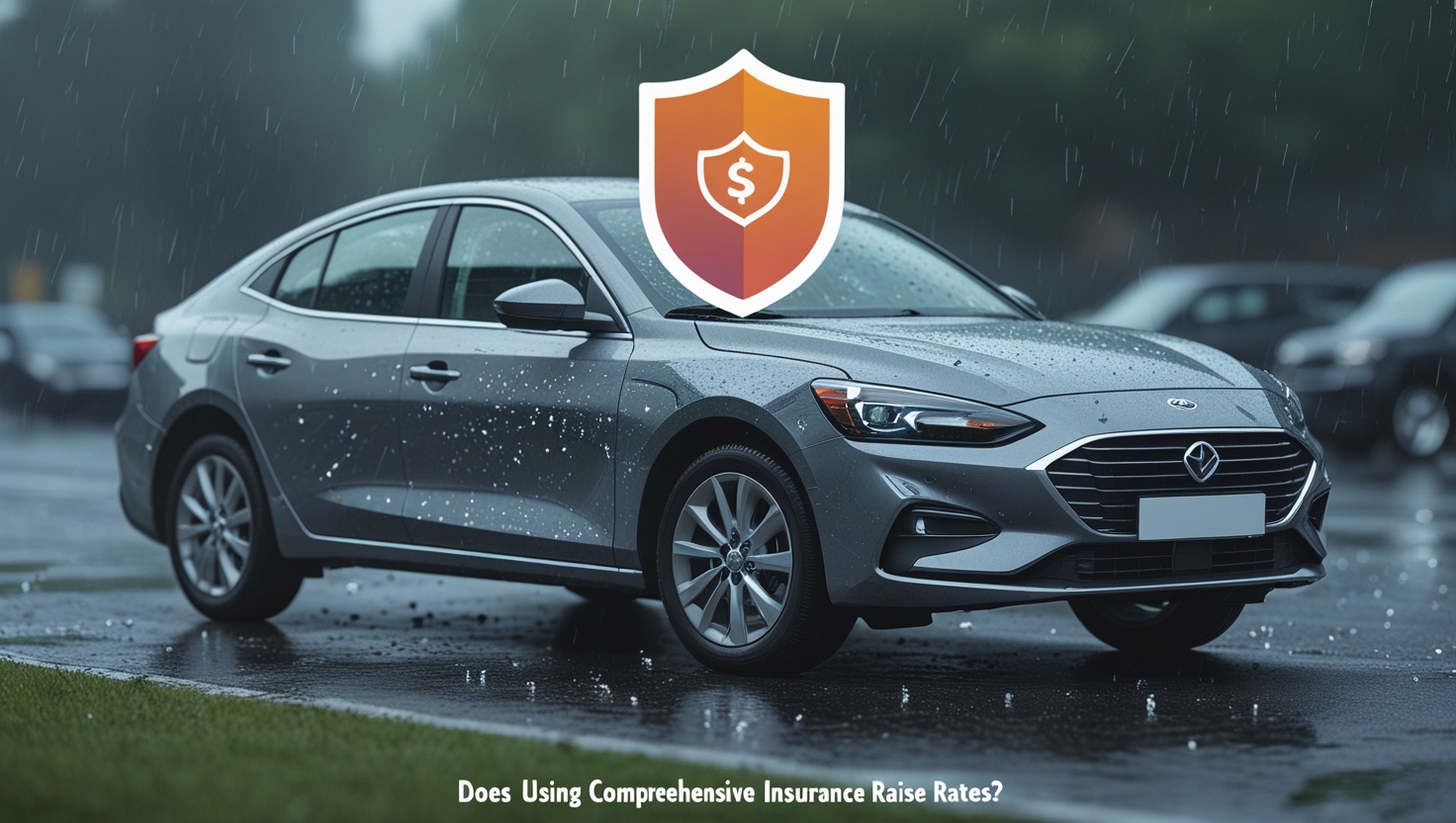Table of Contents
Introduction: Is Your Insurance Bill About to Get Bigger?
You walk out to your car after a heavy storm and find a fallen tree branch denting your hood. Thankfully, you have comprehensive insurance—but a lingering question buzzes in your mind:
“Will filing a comprehensive claim make my insurance rates go up?”
It’s a common concern among drivers who want peace of mind without paying extra down the road. Understanding how insurance companies evaluate claims can help you make smarter decisions after an incident.
In this article, we’ll dive deep into the world of comprehensive claims, rate changes, and what you can do to protect yourself—without the generic fluff. Let’s get started.

What is Comprehensive Insurance, Really?
Before we tackle how it affects your rates, let’s first define what comprehensive insurance covers:
✅ Natural Disasters: Floods, hailstorms, earthquakes
✅ Theft and Vandalism: Stolen or damaged vehicles
✅ Animal Collisions: Like hitting a deer
✅ Falling Objects: Trees, signs, or debris
✅ Fire and Explosions
Unlike collision insurance (which covers accidents with other vehicles), comprehensive deals with everything else. Think of it as coverage for the unexpected things that aren’t your fault.
Quick Table: What Comprehensive Insurance Covers
| Event | Covered by Comprehensive? |
|---|---|
| Tree falls on car | ✅ Yes |
| Crash with another car | ❌ No (Collision covers) |
| Theft or vandalism | ✅ Yes |
| Hailstorm damage | ✅ Yes |
| You rear-end another car | ❌ No (Collision covers) |
Does Using Comprehensive Insurance Raise Rates? (Short Answer)
Short answer: It can, but it usually doesn’t affect your rates as much as collision claims.
Many insurers view comprehensive claims differently because the driver often had little or no control over the event. That said, frequent claims—even if they’re “not your fault”—can eventually paint you as a higher risk.
A Closer Look: When Does a Comprehensive Claim Impact Your Premium?
Insurance companies use many factors to decide whether a rate hike is justified after a claim. Here’s a breakdown:
📈 Factors That Might Cause a Rate Increase:
- Claim frequency: Multiple comprehensive claims within a few years
- Claim amount: Very expensive repairs can raise eyebrows
- Your overall risk profile: If combined with other traffic violations or collision claims, it looks riskier
- Insurer policies: Some companies are more forgiving than others
For example, Progressive notes that while not all claims lead to increased rates, a pattern of frequent claims might result in higher premiums.
Real-World Example:
Sarah filed a comprehensive claim after her car was vandalized. It was her first claim in five years, and her insurance rate stayed the same. However, her neighbor, Mike, filed three comprehensive claims within two years (hailstorm, theft, fallen tree)—and saw a 15% rate hike during his renewal.
Industry Insights: What Do the Experts Say?
According to NerdWallet, comprehensive claims are among the least likely to cause a major premium spike compared to at-fault collision claims.
Here’s a visual:
Average Rate Impact by Claim Type
| Type of Claim | Average Rate Increase (%) |
|---|---|
| At-fault collision | 45% |
| Comprehensive (large) | 3%-10% |
| Comprehensive (small) | 0%-5% |
| Theft claim | 5%-15% |
👉 Takeaway: Minor comprehensive claims often have little to no impact. Large claims might bump your rate slightly.
Comprehensive vs Collision Claims: Key Differences
It’s important to understand why comprehensive claims tend to be “gentler” on your premium.
| Feature | Comprehensive Insurance | Collision Insurance |
|---|---|---|
| Fault Required? | ❌ No | ✅ Yes (usually) |
| Common Incidents | Theft, weather, animals | Crashing into another car |
| Impact on Rates | Lower | Higher |
| Deductible Applied? | ✅ Yes | ✅ Yes |
Insurance companies reward drivers for being “less risky,” and many comprehensive claims are viewed as unavoidable.
Personal Experience: When My Rate Stayed the Same
A few years ago, I filed a comprehensive claim after a nasty hailstorm battered my new SUV. I worried I’d be punished at renewal time, but my insurer (Geico) reassured me it wouldn’t impact my rate—and it didn’t.
They explained that weather-related claims are often treated more leniently because they don’t signal reckless driving behavior.
Tip: Always call and ask your insurance agent how a claim might affect your rates before filing if the damage is minor and repairable out-of-pocket.
How to Minimize Insurance Rate Hikes After a Comprehensive Claim
You can’t control the weather—but you can control your insurance game plan. Here’s how:
- Choose higher deductibles: Higher deductibles lower premiums and discourage small claims.
- Bundle your insurance: Combining home and auto policies often earns loyalty discounts.
- Ask about accident forgiveness: Some companies extend forgiveness to comprehensive claims too.
- Shop around: Not all insurers treat claims equally. If your rate jumps unfairly, it might be time to switch.
- Protect your vehicle: Garage parking, alarm systems, and anti-theft measures lower comprehensive risks.
Bonus: When Not to File a Comprehensive Claim
If the damage is minor and repair costs are near your deductible, it might be smarter to pay out-of-pocket. Filing a claim for $600 when your deductible is $500 doesn’t make much financial sense.
Should You Ever Avoid Using Your Comprehensive Insurance?
This is where nuance comes in. If you’re dealing with significant damages—like a stolen car or $5,000 hail damage—you should absolutely file a claim.
But for cosmetic issues, minor glass chips, or small dents, it might be worth paying privately.
Ultimately, insurance is about managing big risks, not nickel-and-diming small ones.
Final Thoughts: Don’t Fear Your Comprehensive Insurance
Using your comprehensive insurance won’t automatically torpedo your premium—but knowing when and how to file can make a huge difference over time.
Be strategic. Protect yourself. And remember: Insurance is your safety net, not a punishment.
Ready to Get Smarter About Your Insurance?
Have questions about your current policy? Thinking about switching carriers after a rate hike?
👉 Contact us today for a free insurance review—or check out our other guides to become an insurance expert in your own right.
Don’t forget to share your story in the comments!
Have you ever had a comprehensive claim? Did it raise your rate? Let’s swap experiences below! 🔥
Suggestions for Visuals:
- 📸 Infographic: “Comprehensive vs. Collision Insurance: Key Differences”
- 📸 Chart: “Average Rate Impact by Type of Claim”
- 📸 Photo: “Car with hail damage” to match personal story





Awesome https://dub.sh/LAqZ3qv